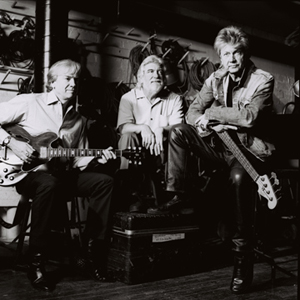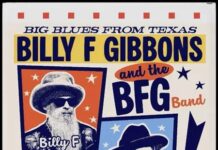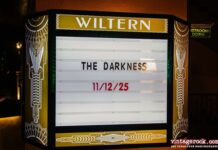Review by Shawn Perry
There aren’t enough superlatives to describe the magical allure of the Moody Blues. If you throw aside the flash, gimmicks and clothing lines, there are few bands able to sustain their careers on music alone. This is the very antithesis of everything the Moody Blues represent. They are a band of consummate professionals with a clear-cut objective: to please their audience with an exquisite elixir of sophisticated music. They will settle for nothing less.
I first witnessed the glory of the Moody Blues in concert back in 1981, on tour in support of their Long Distance Voyager album. At the time, the group was in the process of reinventing themsleves after enjoying massive success during the 70s — when entire long-player sides from their classic seven albums dominated the airwaves. For the new album and tour, they recruited veteran keyboardist Patrick Moraz (formerly of Yes) to replace the departed Mike Pinder whose songwriting contributions and pioneering use of the Mellotron dramatically impacted the band’s unique sound. Nevertheless, the Moodies chose to streamline their material somewhat, and resolved to roll through the 80s unabated, avoiding the nostalgic label. By all accounts, they succeeded beyond all expectations.
Veteran Moody Blues fans may have had a hard time appreciating light fare like “In Your Wildest Dreams” and “I Know You’re Out There Somewhere,” but the public at large ate it up big time. Perhaps the mystical innovation of the Moodies’ previous efforts was missing, but no one could deny that the newer songs had the proper commercial appeal record buyers of the 80s could relate to.
By the end of the decade, Moraz was out of the picture, the group was reduced to a quartet with plenty of hired help, and they more or less became an oldies group with a huge following. Which wasn’t necessarily a bad thing for a band that started out in the mid 60s. A legion of fans, old and new, continued to fill up arenas worldwide to see and hear the Moody Blues with a catalog as rich and varied as contemporaries like the Beatles, Rolling Stones, the Who and the Kinks.
Throughout the 90s and early 00s, the Moodies teamed up with regional orchestras to recreate the grandeur that has always made their music unique. Their appearance at the Red Rock Amphitheatre in Denver, Colorado was captured on film, and has gone to become a best-selling, widely viewed video, as well as a companion double CD.
And so it was on the opening night of their 2005 U.S. Winter tour at the Pechanga Resort and Casino in the sleepy valley of Temecula, California. The Moody Blues, now pared down to three essential members (Justin Hayward, John Lodge, and Graeme Edge) and supplemented by four additional musicians (Paul Bliss on keyboards, Gordon Marshall on drums and percussion, Bernie Barlow on back vocals and keyboards, and Norda Mullen on flute, guitar, and backing vocals) breezily swept through their majestic repertoire without missing a beat.
One of the first things you realize seeing a band like the Moody Blues is that these guys have written an extremely diverse selection of great songs. And I’m not just talking about the hits. In between shots of “Tuesday Afternoon,” “Ride My See-Saw,” and “I’m Just a Singer (In a Rock & Roll Band)” were well-placed obscurities like “The Actor” and “Are You Sitting Comfortably,” both delicately performed with Hayward plucking an acoustic and emoting each verse with true-to-form conviction. And hearing Lodge’s “Talking Out Of Turn” was a real treat as it’s always been one of my favorites from Long Distance Voyager.
Even though Hayward and Lodge write a bulk of the material, and therefore, sing most of the songs, Edge came out from behind his drums to perform a spirited rendition of “Higher And Higher” from 1969’s To Our Children’s Children’s Children. Caught up in the excitement, the crowd rose to their feet. Edge, who resembles a healthier, leaner and more compact Jerry Garcia, obliged by dancing a kind of funky jig across the stage. In the moment, at this particular time in space, he could do no wrong.
During the course of the evening, the band mixed in older songs with newer songs without slowing the pace. It made it easy to trace the timeline of “The Story In Your Eyes” through “Another Side Of Life” right up to 2003’s “December Snow,” an appropriate ode for the post-holiday season. But like many legendary performers of their era, the Moodies like to save the best for last. Once the inimitable notes of “Nights In White Satin” wooed the crowd into a submissive daze, the booming histrionics of “Question” stirred them to action. Watching security in their attempts to calm down a few well-dressed, neatly coiffed women in the front row was a sight to behold. Watching the Moody Blues marvel at the adulation, while keeping their even tempered cool was simply priceless.




















